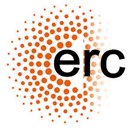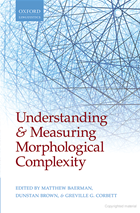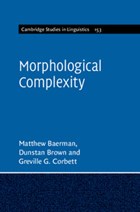Morphological complexity: Typology as a tool for delineating cognitive organization
Workshop on Computational Approaches to Morphological Complexity
The Surrey Morphology Group held a one-day workshop on computational approaches to morphological complexity, hosted by Paris-Sorbonne University, at the Maison de la Recherche on Friday, 22 February, 2013.
Background
Inflection often (or even typically) displays formal patterns which cannot be readily derived from the syntactic and semantic categories which it realizes. Phenomena such as inflectional classes, syncretism, defectiveness and deponency manifest what appear to be a purely morphological element in the composition of words and paradigms. Computational treatment of these questions has proved particularly insightful, yielding some of the most interesting contemporary research on morphology. This workshop is devoted to exploring some of the latest trends, with invited speakers Roger Evans (Brighton) and Olivier Bonami (Paris).
Programme
22 February 2013
| 09.30 - 09.50 | Introduction |
| 09.50 - 10.50 | Benoît Sagot (INRIA & Université Paris–Diderot) 'Tutorial: Comparing complexity measures’ |
| 10.50 - 11.10 | Break |
| 11.10 - 12.10 | Olivier Bonami (Université Paris‐Sorbonne, LLF, IUF) ‘Towards a robust assessment of implicative relations in inflectional systems’ |
| 12.10 - 13.10 | Roger Evans (NLTG, Brighton) ‘Looking for the wood among the trees - what is the empirical evidence for inheritance?’ |
| 13.10 - 15.00 | Lunch |
| 15.00 - 16.00 | Berthold Crysmann (CNRS, LLF) ‘Eliminating rule blocks from realisational morphology’ |
| 16.00 - 16.30 | Break |
| 16.30 - 17.30 | Gregory Stump (Kentucky) ‘Contrasting modes of representation for inflection-class systems and their implications for computing morphological complexity’ |
Project members
Prof Greville G. Corbett
Dr Matthew Baerman
Prof Dunstan Brown (University of York)
Dr Scott Collier
Dr Maris Camilleri
Period of award:
February 2009 - January 2015
Funder
European Research Council (ERC)
TOP




